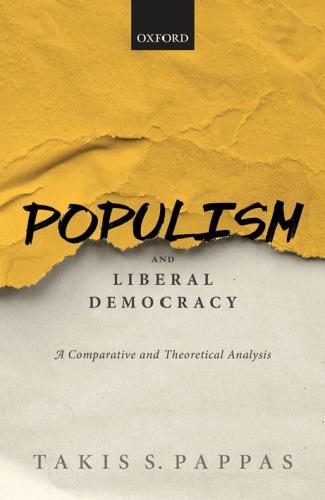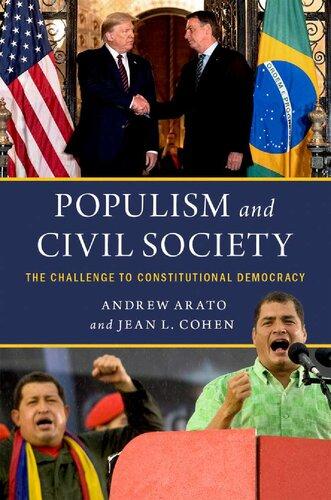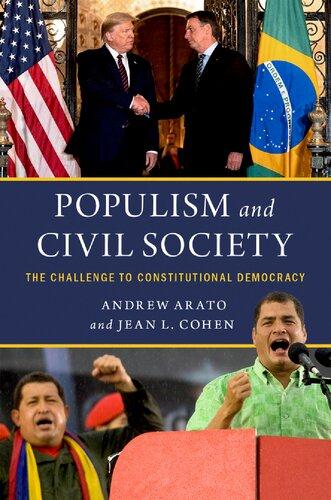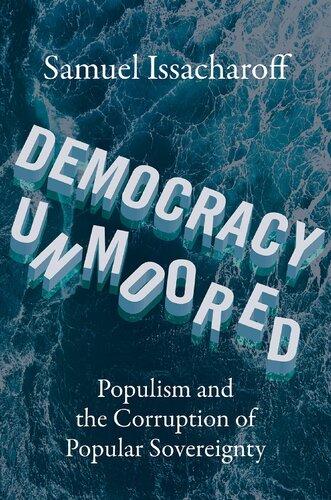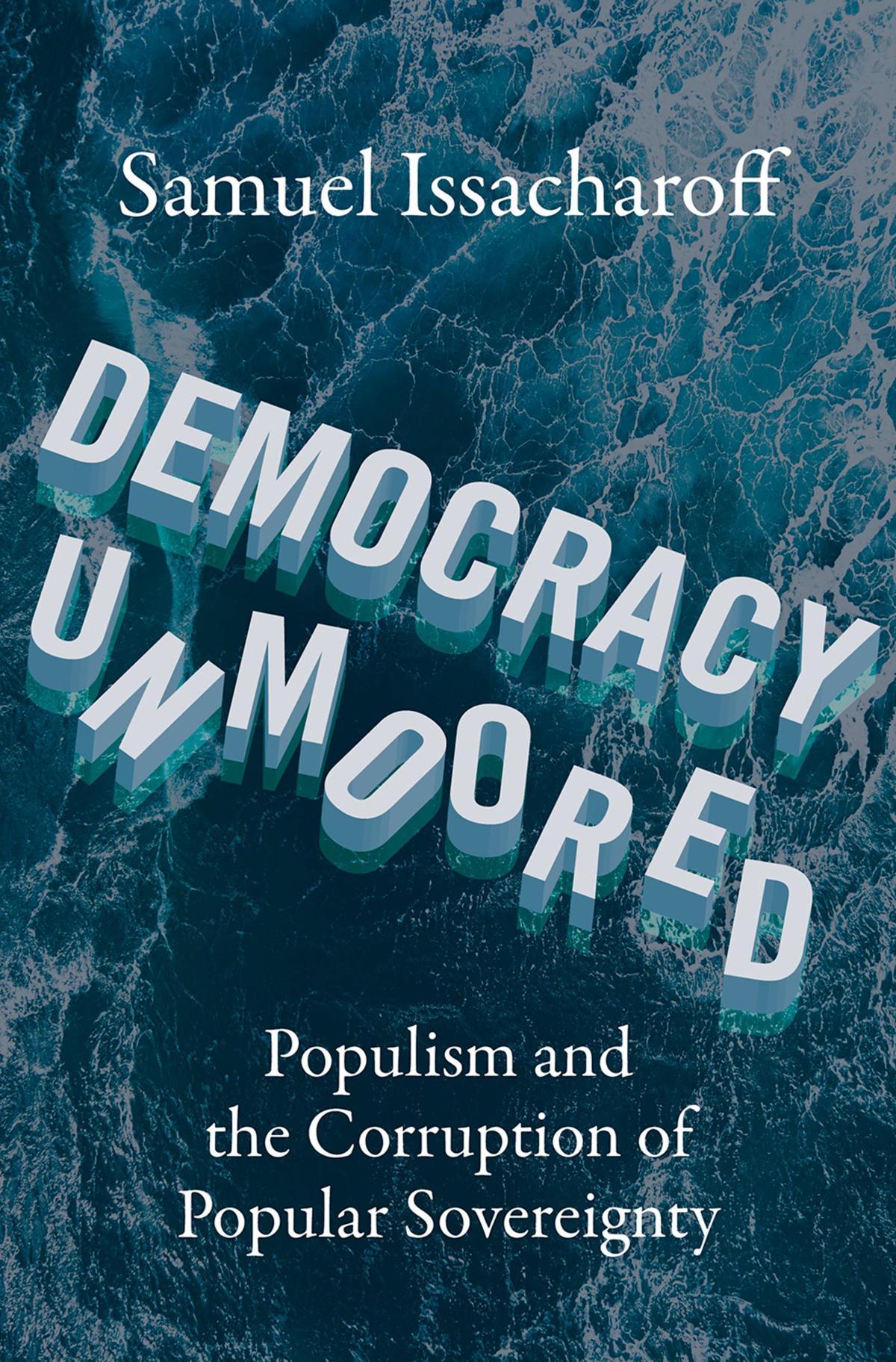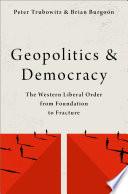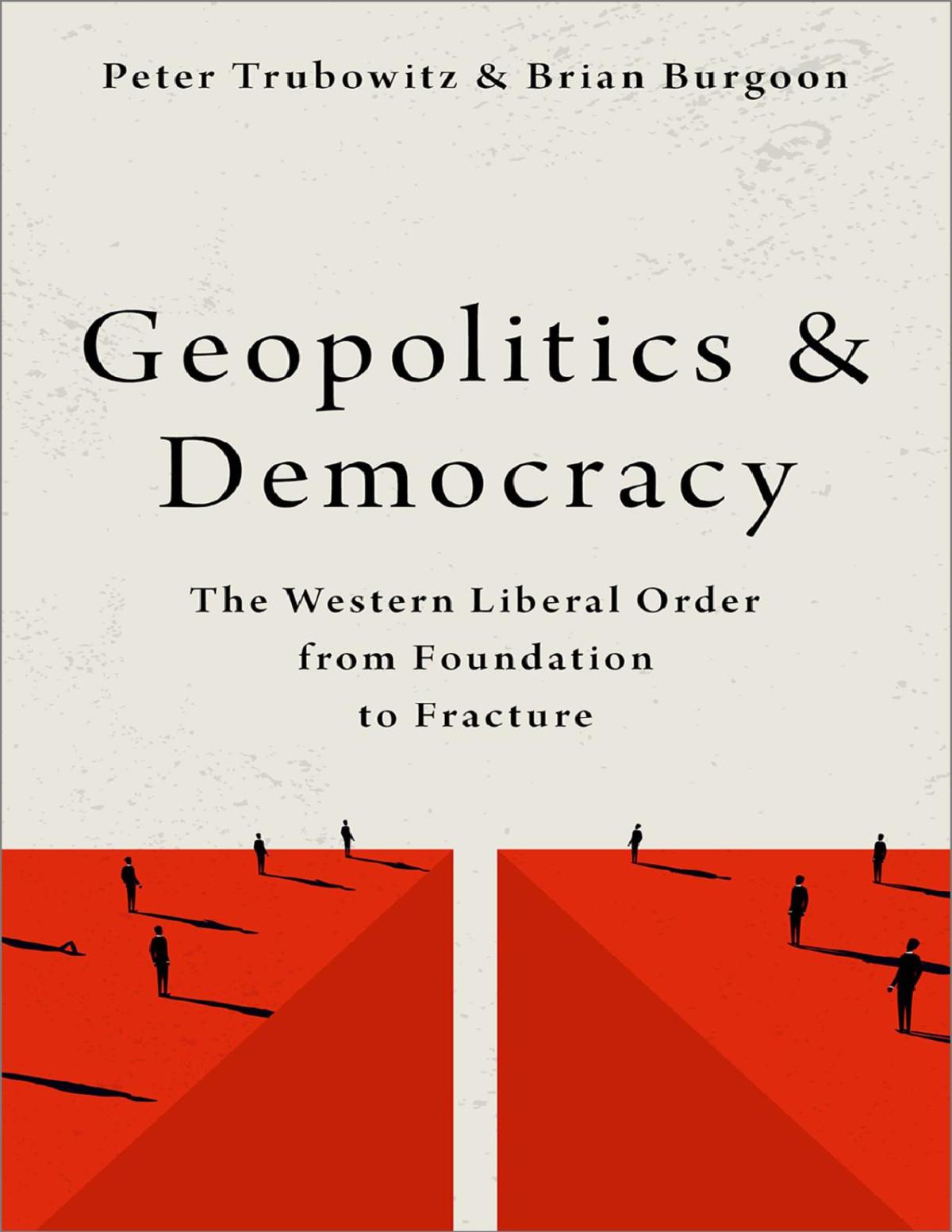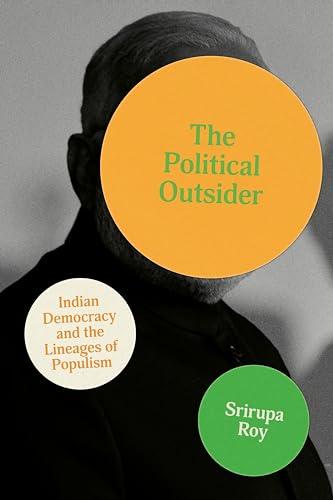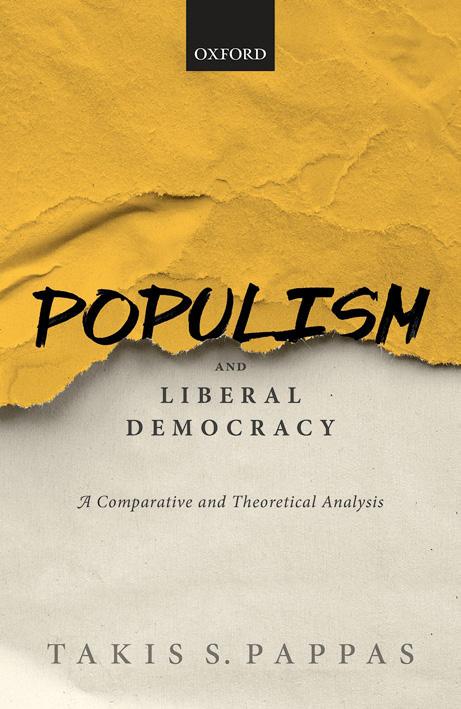Populism and Liberal
Democracy: A Comparative and Theoretical Analysis Takis S. Pappas Visit to download the full and correct content document: https://ebookmass.com/product/populism-and-liberal-democracy-a-comparative-and-t heoretical-analysis-takis-s-pappas/
More products digital (pdf, epub, mobi) instant download maybe you interests ...
Populism and Civil Society: The Challenge to Constitutional Democracy Andrew Arato
https://ebookmass.com/product/populism-and-civil-society-thechallenge-to-constitutional-democracy-andrew-arato/
Populism and Civil Society: The Challenge to Constitutional Democracy Andrew Arato
https://ebookmass.com/product/populism-and-civil-society-thechallenge-to-constitutional-democracy-andrew-arato-2/
Democracy Unmoored. Populism and the Corruption of Popular Sovereignty Samuel Issacharoff
https://ebookmass.com/product/democracy-unmoored-populism-andthe-corruption-of-popular-sovereignty-samuel-issacharoff/
Democracy Unmoored: Populism and the Corruption of Popular Sovereignty 1st Edition Issacharoff
https://ebookmass.com/product/democracy-unmoored-populism-andthe-corruption-of-popular-sovereignty-1st-edition-issacharoff/
American Comparative Law: A History David S. Clark https://ebookmass.com/product/american-comparative-law-a-historydavid-s-clark/
Geopolitics and Democracy: The Western Liberal Order from Foundation to Fracture Peter Trubowitz
https://ebookmass.com/product/geopolitics-and-democracy-thewestern-liberal-order-from-foundation-to-fracture-petertrubowitz/
Philosophy and Neuroscience: A Methodological Analysis
Steven S. Gouveia
https://ebookmass.com/product/philosophy-and-neuroscience-amethodological-analysis-steven-s-gouveia/
Geopolitics and Democracy. Western Liberal Order from Foundation to Fracture Peter Trubowitz
https://ebookmass.com/product/geopolitics-and-democracy-westernliberal-order-from-foundation-to-fracture-peter-trubowitz/
The Political Outsider: Indian Democracy and the Lineages of Populism 1st Edition Srirupa Roy
https://ebookmass.com/product/the-political-outsider-indiandemocracy-and-the-lineages-of-populism-1st-edition-srirupa-roy/
POPULISMANDLIBERALDEMOCRACY PopulismandLiberal Democracy AComparativeandTheoreticalAnalysis TAKISS.PAPPAS GreatClarendonStreet,Oxford,OX26DP, UnitedKingdom
OxfordUniversityPressisadepartmentoftheUniversityofOxford. ItfurtherstheUniversity’sobjectiveofexcellenceinresearch,scholarship, andeducationbypublishingworldwide.Oxfordisaregisteredtrademarkof OxfordUniversityPressintheUKandincertainothercountries
©TakisS.Pappas2019
Themoralrightsoftheauthorhavebeenasserted
FirstEditionpublishedin2019
Impression:1
Allrightsreserved.Nopartofthispublicationmaybereproduced,storedin aretrievalsystem,ortransmitted,inanyformorbyanymeans,withoutthe priorpermissioninwritingofOxfordUniversityPress,orasexpresslypermitted bylaw,bylicenceorundertermsagreedwiththeappropriatereprographics rightsorganization.Enquiriesconcerningreproductionoutsidethescopeofthe aboveshouldbesenttotheRightsDepartment,OxfordUniversityPress,atthe addressabove
Youmustnotcirculatethisworkinanyotherform andyoumustimposethissameconditiononanyacquirer
PublishedintheUnitedStatesofAmericabyOxfordUniversityPress 198MadisonAvenue,NewYork,NY10016,UnitedStatesofAmerica
BritishLibraryCataloguinginPublicationData Dataavailable
LibraryofCongressControlNumber:2018962711
ISBN978–0–19–883788–6
PrintedandboundinGreatBritainby ClaysLtd,ElcografS.p.A.
LinkstothirdpartywebsitesareprovidedbyOxfordingoodfaithand forinformationonly.Oxforddisclaimsanyresponsibilityforthematerials containedinanythirdpartywebsitereferencedinthiswork.
ToGiovanniSartoriandhisgeneration forthesparks,the flame,andthelight. AndtoZina,Antigone,andStefanos forenlightenment,truelove,andthereallife.
Preface Truthbetold,Ihavelivedmostofmylifeunderpopulistrule.Inthelate 1970s,asayoungstudentoflawinGreece,Iexperiencedtheirresistibleascent ofthe(deceivinglylabeled)PanhellenicSocialistMovement,PASOK,whichin 1981,undertheleadershipofmaverickAndreasPapandreou,becamepostwar Europe’ s firstpopulistpartytowinofficebyalandslide.Iwitnessedthemass rallies,thespeechesfrombalconies,theenthusiasmofthecrowds,theseductiveslogans,theaccumulatedsocialresentmentandthepolarizationitbred, thepoliticalslanders,thedisrespectforinstitutionallegality,theexuberanceof promises,theirresistiblepromiseofunfoundedhopeaboveall,whichleftme withanindelibleimpressionofhowliberalpoliticscangoawry.WhenI first leftmycountryintheearly1980s,populismwas firmlyestablishedinpower andalreadyhardatworkonproducingtheimmensepoliticalandsocial changesthatwouldlatercausesocialmisery,nationalpoliticalhavoc,and lotsofinternationaldrama.
Meanwhile,IfoundmyselfagraduatestudentatliberalYale,studyingparty politicsunderthesupervisionofJuanLinz,butatthetimealsobeingfascinatedbytheworkofsuchscholarsasGinoGermani,GuillermoO’Donnelland TorcuatoDiTellaonLatinAmericanpolitics,especiallyJuanPerón’smobilizationistpopulism.LittledidIknowbackthenthatpostwarArgentinaand post-authoritarianGreecewouldbethetwocasesbestapproximatingthe “idealtype” ofpopulismwhen,severalyearslater,populismbecamethe majortopicofmyacademicresearch.NorcouldIhaveeverimaginedduring myearlierdecadesthatIwouldhappentoliveandworkinseveralcountries wherepopulismdevelopedpoliticallyandelectorallystrong,including (besidesofcourseGreeceandtheUnitedStates),Italy,France,andHungary. Itisperhapsbecausepopulismbecamesuchanunwelcomehappenstancein mypersonalandprofessionallifethatIdecidedtosummonthedemon.This volumeismytestimonytothateffort.
Idealtwithpopulismasaresearchtopicforthe firsttimein2010atan ECPRconferenceatMünster,Germany,organizedbyAnn-CathrineJungar andKevinDeegan-Krausse.Alreadyunhappywiththeconceptualconfusion surroundingthetopic,Ipresentedinthatmeetingapaperthatreconceptualizedpopulismas “democraticilliberalism”*andproposedstudying
*Atthetime,therewereonlytwonotableprevioususesoftheterm “democraticilliberalism.” The firstwasmadebyCollierandLevitsky(1997:438)fordescribinga “diminishedsubtypeof democracy” withoutcivilliberties,forwhichtheauthorsofferedGuatemalaastheirsole example.TheseconduseofthetermbelongstoFareedZakaria,who,ratherthandealingwith
Preface
itdynamicallyas “the flipsideof[postwar]politicalliberalism.” Alas,such heterodoxnoveltiesanythingbutsatisfiedthereviewersofthejournalsto whichIsubsequentlysubmittedthepaper,which,afteracoupleofrejections, eventuallyappeared,ratherunceremoniously,inoneoftheWorkingPaper seriesoftheEuropeanUniversityInstituteinFlorence(Pappas2012;the quotationsabovearefromthiswork,p.2).NexttimearoundIwas,however, luckier.AnewpaperIwrotecomparingthegrowthofpopulisminpostauthoritarianGreeceandpost-communistHungary inwhichInotonlyused mythennoveldefinitionbutalso floatedtheideaofpopulismcausingparty systemiccontagionthatcouldpotentiallyleadto “populistdemocracy”—was publishedinarespectablejournal(Pappas2014b; firstonlinepublicationin July2013).Notlongthereafter,inthesummerof2014,Iwasastonishedto hearthesince-famousspeechbyHungary’spopulistPrimeMinisterViktor Orbáninwhichheopenlyproclaimedhisintentiontoturnhiscountryintoan “illiberaldemocracy.” Andthen,aspopulismgrewstrongerinseveralnations andbecamemorewidespreadgeographically,theterm “democraticilliberalism” gainedrapidtractionamongacademics,politiciansand,ofcourse,the press.Butscholarshiponthetopic,albeittremendouslyexpansive,remained hopelesslystuckwitholdconceptsandfuzzycaseclassifications.Ibelieved then,andstillbelievetoday,thattheproblemhasbeenourneglectofsolid empiricalresearchatcountry-levelforproducingbook-lengthstudieson particularpopulisms.
Byreasonofmycountry’scontinuingmisfortunes,thatcouldnotbemy case.Alreadybytheearly2010s,whatwassoontobecomeknownasthe “Greekcrisis” wasinfullanddramaticswing,andthereasonforitwasthe inabilityoftheoldpopulistpartiestomakeatransitiontoliberalism,especiallyasnewpopulistpartiesgrewinthemeantimestrongandpower-hungry. Forasecondtimeinherpost-authoritarianhistory,Greecehadbecomea “crucialcase” (inHarryEckstein’s(1975)sense)forstudyingoldandnew,left andrightpopulismshardatwork.Fascinatedbytheevolvingeventsinmy country,Itookabreakfrommymoretheoreticalruminationsaboutpopulism ingeneral,andwrotearelativelyshortmonographfocusedontheGreekcase withthepurposeof empirically testingmyup-and-comingtheory.For,as notedinthatbook’sintroductorypages,Greece “offersnearlaboratoryconditionsforstudyingallpossiblefacetsandsuccessivephasesofpopulist development,includinginitialemergence,subsequentdevelopment,ascent topower,andpolitycontamination” (Pappas2014a:6).Therewassomething
orevenspecificallyreferringtopopulism,pointedtoanassortmentofregimesaroundtheglobe “thatliebetweenconfirmeddictatorshipandconsolidateddemocracy,” thoseincludingEthiopia, SierraLeone,Pakistan,Belarus,Bangladesh,thePhilippines,andHaitiamongothers(Zakaria 1997).Noneofthosestatesfallswithinthescopeofthisbook.Forafurtherdiscussionof Zakaria’snotionofilliberaldemocracy,seePappas(2018b).
evenmoreimportanttothat.Post-authoritarianGreeceoffereditselfasaclear caseofapoliticalsysteminwhichliberalismandpopulismclashedviolently, withpopulismbeingtheultimatewinner withfatefulconsequences.But Greecewasnottheonlycaseofrisingpopulismand,whenlookingatsuch casescomparatively,apatternbegantoemerge.Itwasearlyautumnof2015 whenIdecidedtotakethechallengetowriteatheoreticalbookoncomparativepopulism.
Whileworkingonthepresentvolume,Ioftenthoughtofitastheclosest onecangettoanacademicstartup.Ithasbeenalargelyself-financedand externallyunassistedenterprise,whichsetabouttosolveamajorpolitical problemdevelopingcontemporaneouslywithmyresearchandwriting,trying asolutionthatattimesseemedoff-beatandratheroutlandish,andwith successanythingbutguaranteed.Aswithanyotherstartup,ithashadits badtimesanditsgoodtimes.Thankfully,thereweremanymoregoodtimes thanbadones,andtheywereimmenselyfulfilling.Whileworkingonthis project,IenjoyedthepleasuresoffamilylifeinStrasbourg,France,digressed forsometimetowriteabookinGreekonadifferenttopic,andheldvarious teachingandresearchpostsinanumberoffantasticacademicandresearch institutionsacrossEurope.Ihadtwogreatadvantages.The firstwastime plentyoftime,myonlydifficultybeinghowtomanageitcleverly.Often enough,Iwentthroughseveralperiodsof “slowhunch” (Johnson2010) duringwhichmanyearlyinsightsbecameclearerandclearer.Insomeof thoseperiods,whichcoincidedwithlongstaysinGreeceandHungary,Ihad theopportunityonceagaintowitnesspopulistpoliticsinrealaction,and experienceitsdeleteriouseffectsuponsociallifeandpoliticalcultureinboth places.MysecondadvantagewasthegreatopportunitiesIhavehadinrecent yearstogivelecturesorparticipateinmanyaworkshopinvariousplaces aroundtheworldthankstoexcellentcolleaguesandpreciousfriendswhowere generousenoughtoofferinstitutionalhospitalityandintellectualstimulation.
Forthemostpart,Iwrotestandingontheshouldersofgiants.Ireadily acknowledgethetransformationalinspirationonanumberofkeytopicsin thisvolumethat,overyears,Ihavereceivedfromthefollowingbooks,citedin theirauthors’ alphabeticalorder:RobertDahl’ s Polyarchy;AlbertHirschman’ s ThePassionsandtheInterests;EricHobsbawm’ s, PrimitiveRebels;Daniel Kahneman’ s ThinkingFastandSlow (withhisearlyarticlesco-authored withAmosTrevskyasanextrabonus);DavidLaitin’ s HegemonyandCulture; WilliamH.Riker’ s LiberalismAgainstPopulism;GiovanniSartori’ s Parties andPartySystems;andMaxWeber’ s TheSociologyofReligion.Atacritical turnduringthiswork,JohnRawls’ notionof “overlappingconsensus” became thegoldenkeytoopenquiteafewrustydoors.Myunderstandingofliberal democracyisquitesimilartoDahl’ s “polyarchy.” FromWeber,Itookinspirationfromhisdistinctionbetween “communal” and “associative” socialrelationships,and foralongtime grappledwiththenotionofcharisma.
Preface
AnotherdistinctionthatmadeanearlyimpressiononmewasMichel Oakeshott’ s “politicsofskepticism” againsthis “politicsoffaith.” Ifound veryusefulMaxScheler’snotionof ressentiment,whichalsofondlyreminded meofatimelongpastatYale,whenJuanLinzhad firstbroughtthisconceptto myattentionandinsistedonitsexplanatoryvalue.Asusual,hewasspoton! RichardThaler’ s “endowmenteffect” wasvaluableformeinmakingbetter senseoftheoriesofrelativedeprivationandthinkingaboutmassmobilization thresholds.ItookveryseriouslyBryanCaplan’srecommendationtohisfellow economistswhoseideasarenotquiteinaccordwithconventionalwisdom: writemorebooks,heurged,otherwise “youseemconfusingatbest,andcrazy atworst” (Caplan2007:xii).Itwasapreciouspieceofadvice,whichIsincerely wanttoextendtomyfellowpoliticalscientists.Onlyinabookdoyouhavethe time,space,andopportunitytoexplainyourwholepositionlengthily,candidlyand,ifyouareluckyenough,convincingly.
IprofitedenormouslyfromaworkshoponmyearlydraftchaptersthatPaul KennywaskindenoughtoorganizeformeinCanberra,Australia.Hanspeter KriesiorganizedasimilarworkshopinFlorence,Italy.Thankstoallparticipantsinbothworkshopsforpreciouscommentsandideas.InJanuary2017, whileattheCentralEuropeanUniversityinBudapest,Iwasluckytoattenda publictalkbyMichaelIgnatieffentitled “OpenSocietyanditsNewEnemies” andgetgreatinspirationfromthelivelyQ&Asessionthatfollowed.Ispent mostofJanuaryandFebruary2018attheUniversityofHelsinki,Finland,asa visitingscholar,whereIreworkedmostofthebookchapters.Itwasa particularlycoldwinter,whichmademyappreciationfortheirhospitality andgeneralsupportfromNiiloKauppi,JuriMykkänen,andEmiliaPalonen evenwarmer. Kiitos!Also,thanksgotoBrunodePaulaCastanhoeSilva,Will Freeman,KostasGemenis,DaphneHalikiopoulou,BálintMadlovics,Andreas Schedler,andArisTrantidisforcommentsandsupportatvariousstagesof thiswork.IamindebtedtoRobertoFoa,MichaelFreeden,andIvanKrastev fortheirimportantinsightsandencouragementatthe finalstages.PaulKenny readandgraciouslycommentedonseveralmanuscriptversions,whilemy goodoldfriendHouchangChehabireadandeditedtheentiremanuscript duringasojourninTurkey.Iwasbothluckyandprivilegedtohavethe constantsupportandassistanceofDominicByatt,myeditoratOxford UniversityPress,andhisteamwholookedafterthetypescriptthroughto publication.BrianNorthtookcareofthe finalstylingandcopyediting.Thanks toall.Thereare,tobesure,severalerrorsremaining.Theseareallmine.
PARTI.POPULISMINTHEORY 1.WhatisPopulism?
1.1TheEpistemologyofPopulism14
1.2DealingwithDeficientPremises24
1.3TheMinimalDefinition31 1.4TheOverallFrameworkofAnalysis36
2.HowtoDistinguishPopulistsfromNon-Populists?
3.WhatCausesPopulism?
3.1The “Ordinary” People80 3.2ExtraordinaryLeadership93 3.3SymbolicPolitics106 3.4TheCausalModel123
PARTII.POPULISMINACTION 4.HowandWhereDoesPopulismThrive?
4.1PopulismAscendant:SevenPositiveCases134
4.2PopulismEvaded:TwoNegativeCases159 4.3NewKidinTown:UnitedStates,2016174
5.HowdoPopulistsGovern? 189 5.1PowerSeizure190
5.2TheIlliberalProject:ARationalization210
6.WhoisthePopulistVoter? 215
6.1InsidethePopulistMind216
6.2AnEmpiricalIllustration:Greece,2015222
ListofFigures AllFiguresareauthor’sowncompilation.
1.1.Populismpergenusetdifferentiam34
2.1.Liberalism’spolicynexus53
2.2.Populism’spolicynexus53
2.3.Autocracy’spolicynexus56
2.4.Thecoreclassificatoryscheme58
2.5.Unpackingthecorevariables60
2.6.Classifyingpartiescontestingdemocraticelections62
2.7.Spotthepopulists62
2.8.ClassifyingGreece’smainpartiesafterthe2012 partysystemrestructuring63
3.1.The “littlepeople” inpopulism(EuropeandLatinAmerica)91
3.2.The “averagepeople” inpopulism(UnitedStates)92
3.3.The “nativepeople” innativism93
3.4.Typesofdemocraticleadership95
3.5.Modelingthecausallogicofpopulistemergence124
ListofTables Unlessotherwiseindicated,allTablesareauthor’sowncompilation.
1.1.Populism’snecessary-and-sufficient-conditionsconceptstructure34
1.2.Theoverallframeworkofanalysisforpopulistpartiesandtheir (coreandvariable)properties37
2.1.Postwarliberalismcontrastedwithpopulism(Yes/No)43
3.1.Typesofdemocraticleadershipaccordingtonatureofruleand ruleaims95
3.2.Indexof “extraordinary” leadership99
3.3.Populistpartyleaders,withyearofrisetopowerandpreviousprofession102
3.4.Corepopulismfeaturesandtheircorrespondingpopulistnarrative themes115
4.1.PASOK’selectoralperformance,1974–81140
4.2.MajorpartiesinPeru’spresidentialelections,1980–90142
4.3.Italy’spartysystemtransformation,1992and1994elections148
4.4.Venezuela’sevolutionoftwo-partysystem,1958–93(selectedyears)149
4.5.ParliamentaryelectionsinHungary(selectedyears)158
6.1.Populism:Coreconceptcomponentsandpopulistvoters’ mindsetelements217
6.2.Liberalism:Coreconceptcomponentsandliberalvoters’ mindset elements217
6.3.Greekgeneralelections,2009–15225
Argentina
ListofPoliticalParties PJJusticialistParty
PLLaborParty
Austria
FPÖFreedomPartyofAustria
ÖVPAustrianPeople’sParty
Belgium
VBVlaamsBlok(renamedVlaamsBelang)
Bolivia
MASMovementforSocialism
Brazil
PMDBPartyoftheBrazilianDemocraticMovement
PSDBBrazilianSocialDemocraticParty
PTWorkers’ Party
Denmark
DFDanishPeople’sParty
Ecuador
APPAISAlliance
PREEcuadorianRoldosistParty
Finland
PSFinns(formerlyTrueFinns)
France
FDGFrenchLeftFront
FNNationalFront(renamedNationalRally,NR)
UDCAUnionfortheDefenseofTradersandArtisans
Germany
AfDAlternativeforGermany
CDUChristianDemocraticParty
DieLinkeTheLeft
NPDNationalDemocraticParty
SEDSocialistUnityParty
SPDSocialDemocraticPartyofGermany
Greece
ANELIndependentGreeks
DIMARDemocraticLeft
EPNationalFront
GDGoldenDawn
KKECommunistPartyofGreece
LAEPopularUnity
LAOSPopularOrthodoxRally
NDNewDemocracy
PASOKPanhellenicSocialistMovement
POTAMIRiver
SYRIZACoalitionoftheRadicalLeft
Hungary
FideszFederationofYoungDemocrats/HungarianCivicParty
FKGPIndependentSmallholders’ Party
JobbikHungarianMovementforaBetterHungary
KDNPChristianDemocraticPeople’sParty
MDFHungarianDemocraticForum
MSzPHungarianSocialistParty
SzDSzAllianceofFreeDemocrats
Italy
ANNationalAlliance
DCChristianDemocracy
FIForzaItalia!
LNNorthernLeague(currentlyTheLeague)
M5SFiveStarMovement
MSIItalianSocialMovement
PCICommunistPartyofItaly
PdLPeopleforFreedom
PDSDemocraticPartyoftheLeft
UQCommonMan’sFront
Mexico
PRIInstitutionalRevolutionaryParty
TheNetherlands
LPFPimFortuynList
PVVPartyforFreedom
VVDConservativeLiberals
Norway
FrPNorway’sProgressParty
Peru
APPopularAction
APRAAmericanPopularRevolutionaryAlliance
Cambio90Change90
FREDEMODemocraticFront
Slovakia
LSNSPeople’sPartyOurSlovakia
SNSSlovakNationalParty
Spain
CiUCatalanConvergenceandUnion
CPECommunistPartyofSpain
IUUnitedLeft
PDCDemocraticPactforCatalonia
PNVBasqueNationalistParty
PODEMOSWeCan
PPPopularParty
PSOESpanishSocialistWorkers’ Party
UCDUnionoftheDemocraticCenter
Sweden
SDSwedenDemocrats
Switzerland
SVPSwissPeople’sParty
Turkey
AKPJusticeandDevelopmentParty
UnitedKingdom
BNPBritishNationalParty
SNPScottishNationalParty
UKIPUKIndependenceParty
Venezuela
ADDemocraticAction
COPEISocialChristianParty
MBR200BolivarianRevolutionaryMovement200
MVRMovementoftheFifthRepublic
PSUVUnitedSocialistParty
FourotherOystersfollowedthem, Andyetanotherfour; Andthickandfasttheycameatlast, Andmore,andmore,andmore Allhoppingthroughthefrothywaves, Andscramblingtotheshore. TheWalrusandtheCarpenter Walkedonamileorso, Andthentheyrestedonarock Convenientlylow: AndallthelittleOystersstood Andwaitedinarow.
“Thetimehascome,” theWalrussaid, “Totalkofmanythings: Ofshoes andships andsealing-wax Ofcabbages andkings Andwhytheseaisboilinghot Andwhetherpigshavewings.” LewisCarroll,ThroughtheLooking-Glass andWhatAliceFoundThere
Introduction Although “populism” hasbecomethebuzzwordinalmostanydiscussion about,oranalysisof,contemporarypolitics,andwasevenannouncedasthe CambridgeDictionary2017WordoftheYear,itisstill,asoneofitsstudents has flatlyputit, “farfromobviousthatweknowwhatwearetalkingabout.We simplydonothaveanythinglikeatheoryofpopulism,andweseemtolack coherentcriteriafordecidingwhenpoliticalactorsturnpopulistinsome meaningfulsense” (Müller2016a:2).Facedwithsuchatheoreticalvoid,itis perhapsworthbeginningbyaskingtheobvious:Why,despitethemassive growthinthe fieldofstudiesonpopulism,istherestillnogeneraltheoryof populism?Thereason,Isubmit,issimplythatourresearchendeavorsare defeatedbyconceptualmuddinessandlackofcomparativesophistication.The conceptualmorasshashelpedcreatemassesofempiricalandpseudotheoreticalstudieswhichadduptoverylittle,ifanythingatall.Ideology, discourse,style,symbolicpolitics,inclusion,exclusion,mobilization,charisma,anti-politics,anti-liberalism,thepeople,themasses,theelites,political polarization,socialresentment,symbolicframing,voters’ irrationality these areallconceptsthataresurelycentraltothestudyofpopulism.Butunlesswe areabletoclarifytheseconceptsandincorporatethemintoaunifiedand internallyconsistenttheoreticalframework,weareboundtoproducemore wastefulresearchandperpetuatefuzzinessandincomprehension.
Sincetherestisstilltocome,IshouldbrieflystateherewhereIstandwith respecttopopulismanditstheory.Atthesimplestlevelofanalysis,Isee contemporarypopulismasanemerginghistoricalphenomenonoflatedemocraticmodernitythatopposespoliticalliberalism.Itseekstoinstituteanovel indeed,innovative formofmoderndemocraticpoliticsthatisantagonistic towardsestablishedliberaldemocracy.Takingitforgrantedthateachofthese formsofdemocracyputsforwarditsownsetofideas,politicalprograms,and policyagendasofhowtoconstitutesociety,myanalysisofpopulism whether explicitlyor,attimes,lessso isinconstantjuxtapositiontotheproblems facedbycontemporaryliberaldemocracyand,conceivably,itspresent-day decay.Evidently,Iassumepopulismandliberalismtobedependentvariables, whichalreadysuggestsmyconcernforexploringthefactorsthatcause
populismtoriseand,occasionally,solidifyinpower.Ithereforeintenda theorythatspecifiesthecausalfactors includingcontext,agency,and micro-mechanisms thatmaypropelpopulismtopower,aswellasaccount fortheimpactofpopulismoncontemporary,andfuture,democraticpolitics. Withoutdoubt,currentinterestinpopulismisdriven, firstandforemost,by growingdisquietaboutdemocracyandliberalism,theirdelicateinterplaysand possiblefailures.Therefore,andsincethesetermswillbeinconstantuse throughoutthebook,letmeclarifytheirmeaningandusagerightfromthe outset.(Ahelpfulglossaryisprovidedattheendofthebook,listingallkey termsusedinthetext.)
“Democracy,” first,willbeusedinaminimalist,empirical,andnonnormativefashionassimply “asysteminwhichincumbentsloseelections andleaveofficewhentherulessodictate” (Przeworskietal.2000:54).This conceptionissimilartoJosephSchumpeter’s(1942)notionofdemocracyseen asamechanism,orinstrument,ofselectingone’srulersincompetitive elections,aswellasKarlPopper’sidea(1945)ofdemocracyastheonlysystem inwhichcitizenscanoverthrowtheirrulersbypeacefulelectoralmeans(see, forfurtherinsights,Przeworski1999).Moreover,sinceinthisrespectwe dispensewithnormativity,wealsograntthatdemocraciesmayoccasionally giverisetopartiesorgovernmentsthatare “inefficient,corrupt,shortsighted, irresponsible,dominatedbyspecialinterests,andincapableofadoptingpoliciesdemandedbythepublicgood” (Huntington1991:9).Itis,however, importanttounderline,asHuntingtongoesontoexplain,thatalthoughsuch negativequalitiesmakethosepartiesorgovernments “undesirable,theydonot makethemundemocratic.” Poor-qualitydemocraciesare still democratic. Despiteitssimplicityandstraightforwardness,suchanunderstandingof democracystillleavesunansweredthefollowingquestion:Whathappensif electionsfailtochangegovernments?Inotherwords:Howdemocraticare “democracies” inwhichanelectedgovernmentstaysinpowerforlengthy periodsas,forinstance,isthecaseincontemporaryHungaryinwhichthe samepartyhasenjoyedsince2010threeconsecutiveelectoralvictories?Here, obviously,wearedealingwithso-calledpredominant-partysystems(nottobe confusedwithsingle-partynondemocraticsystems),inwhichonepartyisable tocommand,aloneandovertime,theabsolutemajorityofseatsinparliament (Sartori1976:192–201).Barringtheexistenceofviolenceandopenvoter intimidation,bothsubjecttoempiricalinvestigation,thosesystemswillstillbe consideredtobelongintheclassofpluralistcompetitivedemocracytothe extentthattheyallowforanopenpartymarketwithenoughopportunitiesfor dissent,aswellastheoptionofhavingthepredominantpartytoppledbyballot.
Incontrasttotheforegoinginstrumentaldefinitionofdemocracy, Iunderstandthesecondkeyanalyticalconcept, “liberalism,” inadistinctly normativefashion.Itrevolvesaroundtheideaofindividuallibertybeing supreme,aswellastheneedtoinstitutionallyprotectitwithincomplex
politicalsocieties.Accordingly,whenitcomestodemocraticallyrunnations,a liberal democracyisthepolitythatacknowledges,andisbuiltupon,the followingprinciples:Societycomprisesapluralityofconflictinginterests which,lestthepolityregresstoaHobbesiannightmareofpolarizationand generalizedsocialstrife,mustbesubjecttooverarchingcommonlyagreed institutions,theruleoflaw,andtheprotectionofminorityrights.Giventhe interdependencyofsuchconditions,thepolityceasestoqualifyasaliberal democracyevenifonlyoneofthemisviolated.
Althoughamoredetaileddiscussionofpoliticalliberalismalongtheforegoinglineswillfollowinamoreappropriateplace,wehavealreadyswitched towhatwillbethesumandsubstanceofthebook,namely,populismqua democraticilliberalism.Itscentralpropositionisthat,whilepostwarpolitical liberalismcanonlybeconceivedasdemocratic,theoppositeisnottrue.That istosay,notalldemocraciesareliberal;someofthem,andincreasinglyso,are illiberal.¹Assummarizedbyoneprominentpopulistleader, “justbecause somethingisnotliberal,itstillcanbeademocracy” (Orbán2014).This,in turn,raisestheveryquestionsthatthisvolumeaddressesandwilltryto answer:Howcanliberaldemocraciesdrifttoilliberalism?Whathappens whenilliberaldemocratswinstatepower?Canthepopulistwavebereversed? Toprovideanswerstothesequestions,weneedtodevelopageneraltheory ofpopulismcouchedinwhatisbroadlyknownas “democraticstudies” and guidedbyasimpleinsight,namely,thatmodernpopulism whetherseenasa setofideas,apoliticalleaderactingonsuchideas,aparticularpartychampioningthem,orevenanentirepoliticalsysteminwhichsignificantparties promoteitsessence isfundamentallydemocraticbutinoppositiontothe liberalcanon.Hence, democraticilliberalism becomesasynonymfor populism andassuchitwillbetreatedinthechapterstofollow.Theimplicationfor democraticstudiesisnowquitestraightforward.Nomatterwhatthelevelor unitofanalysisonemaywanttoexamineitat,populismasamodern historicalphenomenonpertainstoatypeofdemocracythatstandsmidway betweenliberalismandautocracy.Itisimportantthatwebecomeawareofthis fundamentalcontradiction,for,sincepopulismcannever findapointof politicalequilibriumandstability,ittendstotiltateithersideofthespectrum, attimestowardsrepairingliberalism,atothertimestowardsexperimenting withautocracy.Thisshouldserveasaclearwarningforpoliticiansand policymakersalike:Removeitsdemocraticethosandpopulismwillturn intoauthoritarianism,butreverseitsilliberaldispositionandwhims,and
¹Thedistinctionbetweendemocraticnessandliberalismisencapsulatedeloquently,albeit slightlyparaphrased,inthisquotation: “Ademocracyisdemocraticinsofarasitinvolves governmentbypopular,competitiveelection,therebyprovidinglegitimationtothe polity....Ademocracyisliberalinthatitlimitsgovernmentalauthorityandprotectsindividual rights,constructingdikes,asitwere,againstthesupposedlysovereignpeople” (Peeler2009:1).
liberaldemocraticorderislikelytobereinstituted.Weshallreturntothese pointslateroninthebook.
Forthetimebeing,asisthecasewithalltheory-guidedresearch,itis necessarythatwesetthescopeconditionsthatspecifythetemporal,geographical,andpoliticalcontextswithinwhichcausalprocessesplayout,thus makingthetheoryrelevant(Cohen1989:83).Scopeconditionsnotonly definethecircumstancesunderwhichtheoreticalclaimsmaybecomeapplicable;theyalsorecommendtheempiricalcasestobeselectedandusedfor comparativeanalysis.
Giventhatthisvolumeisnotaboutpopulismingeneralbutabout modern populismmoreparticularly,itexcludesfromitsscopethreegroupsofparties orotherpoliticalforces.First,itexcludesanypre-modern(thatistosay,precapitalistandpre-democratic) “organizations,movementsandideologiesof allkindsinwhichthenotionof ‘thewillofthepeople’ ...[is]stressed” (Worsley1969:219–20),allofwhichrightfullybelongintherealmofhistorians.Italsoleavesoutpartiesindemocraticstateswheregeography,age-old socialstratificationpatterns,andancientpoliticaltraditionshavethwartedthe developmentofpoliticalliberalism.Insuchplaces,includingmostprominentlyIndia,thePhilippines,Indonesia,andseveralAfricanstates,political liberalismneverputdownroots.Atbest,ashasbeenputsuccinctly,liberalism inthosecasesmaybecharacterizedbyjustthreewords—“pseudo,exclusive, andmisinterpreted” (Manchanda2016:124).Asshownbymanyothers(e.g., Laitin1986,Kenny2017,Mietzner2018),partypoliticsinthosestatesare mostlydeterminedbytraditionalpoliticalpatronage,personalizedleadership, andethnicandreligioustribalismintheirmanyandvariouscombinations. Theconceptofpopulismasusedinthisbookdoesnot fitsuchcases;but neither,Ibelieve,canthewoolly “populism” thatisoftenusedasageneric politicalexplanationgrapplewiththehistoricalandpoliticalcomplexityof thosestates.Finally,onaccountofmodernpopulism’sdemocraticnature,the bookisnotconcernedindepthwithautocraciesandothernon-democratic states,including,forinstance,VladimirPutin’sRussia(Sakwa2004,Roseetal. 2006),Turkey,especiallyunderRecepTayyipErdoğan(Karaveli2018),or Iran(Abrahamian1993),which,althoughoftenclassifiedaspopuliststates,do notmeetourcriteriaofeitherdemocracyorliberalism.
Sincethebookcentersspecificallyonpopulismviewedasaneotericpoliticalphenomenonthatopposes,andseekstosupersede,modernpolitical liberalism,ourfocusofanalysiswillbeonpostwarEuropeandtheAmericas. Underthislens,theconditionsofgeography,historicalperiod,andpolitical significancethatmustbesatisfiedforselectingourcasesinsuchawaythatwill maketheoryrelevantbecomequitespecificandfairlyunproblematic.
First, spatiotemporally,thecountriesexaminedinthisbookarepostwaror, inthecaseofEasternEurope,post-communistdemocracieswithacommon legalandconstitutionalliberaltraditionofsomeconsequence.Evenwithin
thiscontext,sinceitispracticallyimpossible,letalonetheoreticallyimpractical, toincludeallinstancesofmodernpopulism,howarewetochooseourcases avoidingselectionbias?
Tothispurpose,Iintroduceasecondcriterion: politicalsignificance.Bythis, Ibringintocomparativeanalysisanypostwardemocracywithaliberal traditionthathasexperiencedpopulisminofficeforatleasttwoconsecutive elections.Thiscriterionhelpsexcludeahostofcountries(suchasAustralia, NewZealand,orJapan)whereliberalismisstrongwhilepopulismisquite feeble.Italsowarnsagainstthetemptationtostudypopulismglobally,withno respecttotherelativesignificanceofindividualcases.
Whatdotheaforementionedcriteriaofinclusionintothepopulistcategory leaveuswith?Actually,withquitealot.Thecountrieswithimportantpopulist partiesandalong-lastingpracticeofpopulistpolitics,whichwillprovidethe empiricalheartandmatterofthebook,are(inchronologicalorderofpopulist risetopower)thefollowing:Argentina,1946;Greece,1981;Peru,1990;Italy, 1994;Venezuela,1998;Ecuador,2007;Hungary,2010;Greece,2015.Tothese Ihaveaddedforreasonsofcountryimportanceandpoliticalmagnitudethe UnitedStatesofAmerica,2016,which,beingthemostrecentcaseofpopulist emergence,istheonlyexceptiontoour “two-consecutive-elections” criterion.
Itcanbeconfidentlyasserted,then,that,withthepossibleexceptionofthe recent(since2015and2018respectively)PolishandMexicanpopulisms,our sampleincludes all significantepisodesofpopulistruleinthepostwarliberal democraticworld.Theirsignificanceapart,ouruniverseofcasesoffersmaximumvariationintermsofgeographicalandpolitico-culturaldispersion (WesternandEasternEurope,NorthandSouthAmerica),timeofoccurrence (theentirepostwarerafromthemid-1940stothelate2010s),andideological variance(sinceitincludesamixofleftandrightpopulisms which,moreover,inoneofthecases,Greece,haveruledintandemwhileinanothercase, Argentina,thesamepopulistpartyhasshiftedfromrighttoleftandvice versa).Finally,toachievecontrastwithsuccessfulpopulism,wearealsogoing toexaminethenegativecasesofBrazilandSpaininwhichpopulismwaseither ofrelativelyminorimportanceor,whenemergent,becamefrustrated.
Evidently,thisvolumeisofanexplicitlycomparativenature.Itaimsata studyofpopulismthatwillbenomothetic,i.e.,onethatcreativelycombines theoryandcasestudiesinordertorevealcausalexplanationsandarriveat generalpropositions(LichbachandZuckerman1997:ix).Theanalysisto followdrawsfromthreemajortraditionsincomparativepolitics,eachwith itsownontologicalconcerns:macro-institutionalism,micro-structuralism, andindividualchoice bethatofpoliticalleadersorvoters.
Macro-institutionalism beginswithacknowledgingtheexistenceoflongstandingformalpoliticalorganizationsandinstitutionalnormsthatboth regulateandconstrainpoliticaldevelopmentsandsocialchange. Microstructuralism engageswiththestudyoftheparticularmechanisms the
“cogsandwheels”—thatsetpoliticalsystemsinmotionandmakethemtick. Individualchoice theorybringspoliticalagencyintothepictureatbothtop decision-makinglevels,aswellasthelevelofelectoratesatthebottom,andis especiallyconcernedaboutthereasons ortheirlackthereof thatvarious politicalactorsemployintheirpoliticalactions.Ibuildamodelofpopulist emergencethatdrawsonallthreetraditions.Itbeginswithpre-existing institutionsfunctioningasbothconstraintsandopportunities;individual actorsthenenterthemodelbringinginnewsymbolicnarrativesandpolitical cultureframes,andprovidingfocalpointsofaction;tosucceed,theyhaveto triggercertainmicro-mechanisms,which,however,dependontheoriginal institutionalframework.
Methodologically,Irelyparticularlyonpathdependenceandanalytic narratives. Pathdependence, firstly,beginswithanunderstandingofthe institutionalandorganizationalstructuresthatexistedaroundthetimeof initialpopulistemergence,andthewaysinwhichtheyeitherprovidedopportunities,posedconstraints,orboth,inunfoldingdevelopments.Thesequencing inwhichsuchdevelopmentsunfold(BeachandPedersen2013),aswellasthe specificmechanismsthatfacilitatetheunfolding(HedströmandSwedberg 1998),arealsoimportantforunderstandingcausation.Havingacquireda detailedknowledgeofacase, analyticnarratives (Batesetal.1998),secondly, requirethatwe “clearlyidentifythekeyactors,theirstrategicconsiderations,and therelevanttechnological,political,oreconomicconstraints” (Levi1997:31).
Analyticnarrativesthusbecomethebestmeansavailabletotella “compelling tale” (PrzeworskiandSprague1986:181) one,thatis,whichincludesa plausiblecausalmechanism.Ifsuchplausibilitymaybegeneralizedtoother comparablecases,thenwemayclaimtohaveageneraltheory.
Turningtocontents,thisvolumecomprisestwoparts.PartIdealswith thefundamentalconceptual,methodological,andclassificatoryissuesthat, togetherwithsystematizingasemanticvocabulary,arenecessarybefore attemptinganyempiricalscienceofpopulism.PartIIconcernslargecomparisonsandlongprocesses,seekingtoprovideanempiricalpanoramaofmodern populismwithstrongexplanatoryandpredictivepower.Bothpartsaredividedintochapters,eachofthemspecificallyaddressingamajorquestionabout populism.
Chapter1asks: Whatispopulism? Itstartswithaconciseoverviewofthe waysearlierscholarshaveexaminedpopulismduringconsecutivewavesof researchonthetopic(1.1).Itthengoesontoexposecommonconceptualand methodologicalerrors suchasobscuringthegenus,overemphasizingessentialismwhileoverlookingontology,conceptualstretching,theincertitudeabout negativepoles,andthedifficultieswithconceptoperationalization(1.2) before settingouttoelaborateatrulyminimaldefinitionthatcansufficientlyaccount forthecomparativestudyofmodernpopulism(1.3).Thechapterendswitha presentationofthebook’soverallframeworkofanalysis,whichcondenses
themainmethodologicaltools suchasindicators,variables,andconcept properties tobeusedlateronduringtheory-building(1.4).
Chapter2tacklesthequestion: Howtodistinguishpopulistsfromnonpopulists? Itstartswithcontrastingmodernpopulismspecificallywiththe variantofliberalismthatdevelopedinpostwarEuropeandtheAmericas(2.1), thengoingontoofferarationalizationoftheneedtostudypopulismasone ofonlythreealternativesthatwehaveavailablefororganizingpolity the othertwobeingliberalismandautocracy(2.2).Derivingfromourminimal de finitionofpopulism,thefollowingtwosectionsoffercomprehensive classificationsofthepartiesthat are populist(2.3)andthosethatare not thelatterthenpromptlybeingrelegatedtothedistinctcategoriesofantidemocratic,nativist,orregionalistandsecessionistparties(2.4).
Chapter3undertakestoanswer: Whatcausespopulism? Itislargelyabout theessentialsofpopulism itsnuts-and-bolts,sotospeak,thatareabsolutely necessarytofacilitateitsemergence includingthenotionofthepeople, politicalleadership,andsymbolicdiscourse.Goingbeyondeasygeneralizationsabouttheallegeduniformityof “thepeople,” Iintroducea finedistinctionofthreedifferentsubtypesoftheterm,eachwithitsowncharacteristics andpoliticalmindset(3.1).Therefollowsacomparativeanalysisofpopulist leaderswhich,basedonanoriginalreconceptualizationofpoliticalcharisma, demonstratesastartlinglyhighcorrelationbetweenextraordinaryleadership andpopulistsuccess(3.2).Ordinarypeopleandextraordinarypopulistleaders forgetheirrelationshipthroughspecificnarrativesthatarelargelybasedon individualfearsanddeeplyheldsocialresentment(3.3).Thelastsectioninthis chaptermodelsthecausalityofpopulism(3.4).
Chapter4,byexemplifyingempiricallywhathasalreadybeenestablished conceptuallyandtheoretically,answersthequestion: How,andwhere,does populismthrive? Itbeginswithanelaborateanalysisofthemostimportant casesofpopulistemergenceinpostwarEuropeandLatinAmerica(4.1)and continues,incounterfactualfashion,withtwonationcases,BrazilandSpain, inwhichpopulismcouldhavegrownstrong,butdidn’t(4.2).Thisisfollowed byananalysisofmodernU.S.populismincomparativeperspective(4.3).
Populism’semergence,andrisetopower,intheUnitedStateswasphenomenal.Itallhappenedwithinafewmonthsfromlate2015untilthepresidential electionsoflate2016 atimeatwhichIwashardatworkonthesubject. Giventhedevelopingsituation,Ifeltobligedtotakeabreakfrommyother casesandreflectonthechallengesposedbytheriseofDonaldTrumponmy overalltheoreticalframework.Howdidthatreal-lifecase fitintoit?American populismofferedmeseveralfreshinsights,especiallyconcerningtheroleof extraordinaryradicalleadershipandthecomplexitiesofhandlingthe “people” asanostensiblyhomogeneoussocialunit.Ihopethatthoseinsightsgiveextra strengthtothetheorypresentedhereinwhile,atthesametime,alsodemonstratethenon-exceptionalcharacterofAmericanpopulism.
